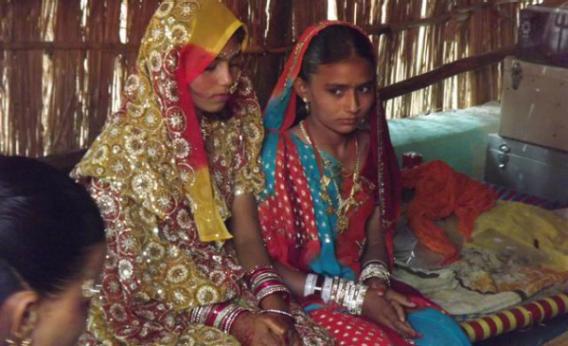Editor’s Note: This is a guest post from members of the advocacy group Girls Not Brides—a coalition of groups that work to end child marriage around the world—written in response to a previous DoubleX piece on the practice in India. You can learn more about the organization on their website.
As activists and researchers who have worked for many years to support and protect girls across India, we were dismayed to read a recent DoubleX article describing a mass wedding and betrothal ceremony of underage girls and boys as a “welcome event.” The article went on to compare child marriage to the prostitution of girls, describing child marriage as “the lesser of two evils.”
In “The Only Good Reason to Have a Mass Wedding of Child Brides,” Jen Swanson described a mass betrothal and wedding ceremony in the Indian state of Gujarat. The author assessed that many of the “fresh-faced” participants in the ceremony were aged from about 10 to 14. One girl was just 8 years old.
According to the author, participants in the ceremony belonged to the Saraniya community, the women of which, for a lack of work and other livelihood opportunities, often have little option but prostitution. The ceremony was justified on the grounds that marriage would protect girls and prevent them from falling into that trap.
What a shameful rationalization! How can child marriage provide a safe alternative for girls when child brides are more likely to suffer domestic abuse than women who marry later? How can child marriage be safe when married girls too are vulnerable to sexually transmitted diseases? How can we justify child marriage when child brides face a high risk of injury and death during pregnancy and childbirth? Girls who give birth before the age of 15 are five times more likely to die in childbirth than women in their 20s.
And, in any case, child marriage does not even guarantee that girls and women will not resort to prostitution. In India, prostitution takes many forms, from street-based to home-based sex work. Many women who turn to prostitution are in monogamous marriages, but poverty has pushed them to seek an additional income through sex work.
The mass marriage in Gujarat is a sad indictment of the situation faced by too many girls in India. Practices like child marriage, dowry, and child prostitution abound because girls are deemed a burden. Boys are valued over girls and parents make choices accordingly. For families who live in poverty, fewer children at home means fewer to feed and clothe. And the younger they marry off their daughters, the smaller the dowry they are obliged to pay a groom.
This is the kind of thinking that needs to be changed. Nongovernmental organizations should be persuading parents and communities of the dangers of child marriage, not actively facilitating it.
Just look what can happen when a girl is supported and empowered: Last month an Indian girl called Laxmi made the international headlines when she took a stand against her child marriage. At 18 years, Laxmi was shocked to find out that her family had married her off when she was just 1. When the time came to go and live with her husband, she turned to a local welfare organization for help. With their support, Laxmi found the courage to take her case to court and annul her marriage.
To change long-held cultural attitudes, groups like the Saraniya community must be offered sound alternatives to early marriage and prostitution, including quality education. And when influential leaders – from the local to the national and international level – are prepared to speak out against it, child marriage will increasingly be seen as unacceptable.
The truth is that by stating that child marriage is a better alternative than prostitution, we are rationalizing what is profoundly wrong. Traditions can change. It starts with people like Laxmi who have the courage to stand up and say enough is enough; it is time to end child marriage.
Rema Nanda of Pathfinder India, and R. Venkat Reddy of the MV Foundation India, and Ann Warner of International Center for Research on Women are all members of Girls Not Brides: The Global Partnership to End Child Marriage.
